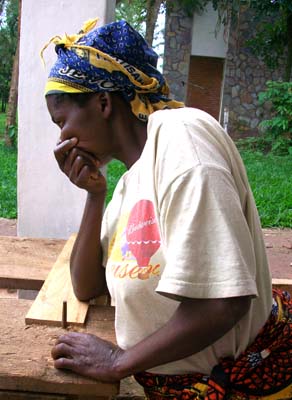Profiles in Congolese Courage

I want to you impress upon you the severity of what is happening here without sensationalizing the violence – and at the same time, speak to the hope that still lives in the hearts of Congolese women. I want you to know that while there are incredible atrocities committed against women, the majority of Congolese men are wonderful human beings. And even though so much attention is given to the women, the men are suffering too – when they are kidnapped by militias, or sexually violated, or killed protecting their families, or rendered helpless by perpetrators while they watch the abuse of their wives and daughters. And I want you to know that Congo is more than rape, war, corruption and danger around every corner. There is a rich culture that persists despite it all, and the country itself has a stunning beauty. It is unfortunate that what is right and good about Congo is unknown to most of us in the West. And so, it is in this conflicted space that I share with you one young woman’s story.
Mateso (not her real name), 13 years old, was walking to the market to sell cassava when she stumbled into an ambush and was kidnapped by the FDLR. She was taken to the bush and kept for one year as a slave during which time she was repeatedly raped and became pregnant. She spoke of a mass grave and her disbelief that she, too, was not killed, considering she was “no better” than those who had died. Because of difficulties with labor and delivery, the soldiers used a knife to increase the size of the vaginal opening. The baby was stillborn. Mateso was then locked in a room for days during which time she was forced to drink the urine of the soldiers and flies began to swarm around her injuries. Because she was so severely wounded, the soldiers never suspected that she might escape. But she found the strength to flee and managed to walk for three nights, hiding during the day. Eventually, she found help and was taken to Panzi. Mateso is 15 now, having lived at Panzi for two years. She suffers from a fistula and despite multiple surgeries, she continues to leak urine. She has family but they live far away so she stays on with the hope that the next surgery will be successful and that she can one day return to her village.
Mateso’s smile is broad and bright, set off by the brilliant blue African print dress she wore the day we met. She approached me with determination as I visited with other women in the hospital courtyard. I was struck by her assuredness and caught off guard when she launched into her story. When I asked her why she felt it was important to share this with me, she said, “I tell you my story because so many people don’t know! I want you to tell others.” Yes, Mateso. Others will know, I promise, and you will not be forgotten.

Lee Ann De Reus is the 2009 recipient of the Carl Wilkens Fellowship, given by Genocide Intervention Network, and an associate professor of Human Development & Family Studies and Women's Studies at Penn State Altoona. She is currently in Bukavu, South Kivu in the Democratic Republic of Congo, where she is conducting interviews with survivors of sexual violence. This is the second in a series of posts."







































No comments:
Post a Comment